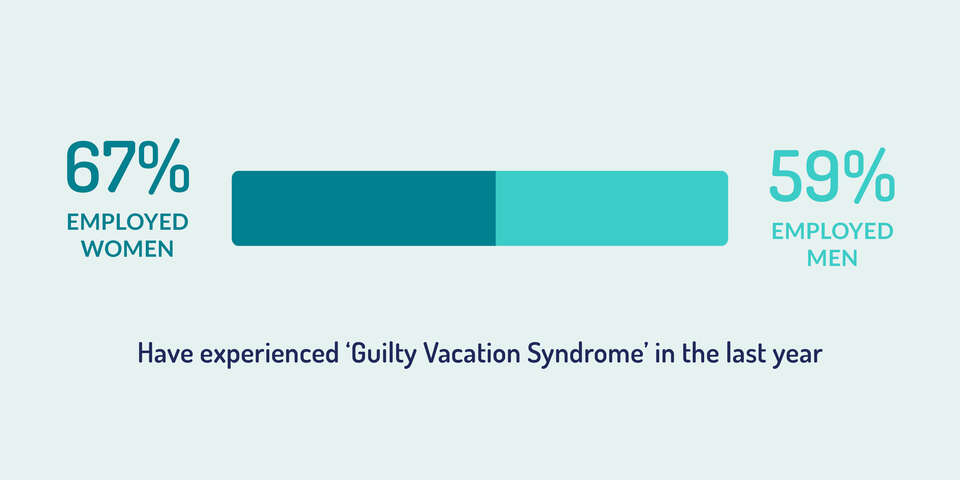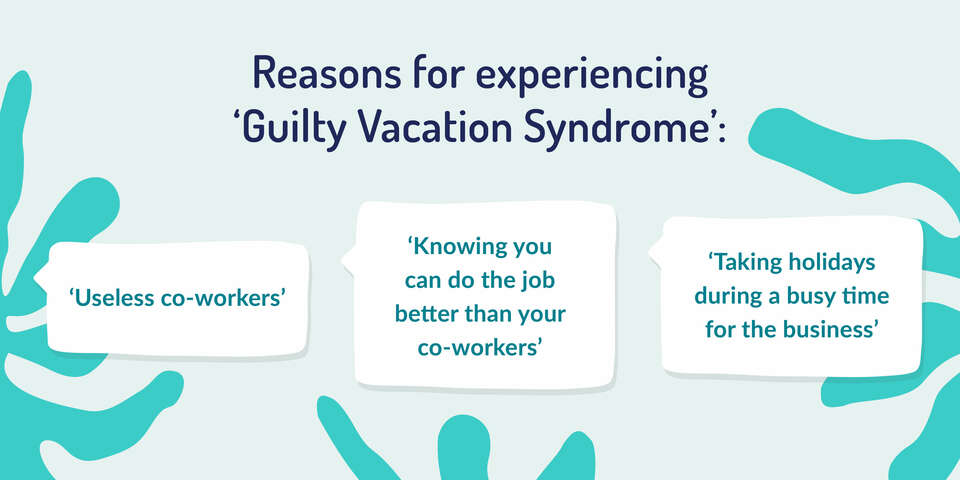Is ‘Guilty Vacation Syndrome’ the latest workplace epidemic?
Preparation for a holiday: Shopping, packing, and... feeling like cancelling it because you don't feel like you can take a break from work?
Have you ever felt guilty about taking a holiday from work? Perhaps you’ve felt bad about leaving coworkers with extra work in your absence, or, maybe, experienced the feeling that you’d rather not use your holiday days because you’ll have to come back to a stack of more work, and more stress, on your return?
If any of these feelings sound familiar, you’re not alone.

‘Guilty Vacation Syndrome’ is the latest workplace epidemic sweeping the nation. Defined as the ‘nagging urge to cancel or delay a vacation due to guilt’ - you may not be familiar with the phrase, but there’s a very good chance that you, or someone you know, will have experienced the feeling.
To find out who suffers from this syndrome, and how this could be better managed, Perkbox conducted a survey of 1,342 people and found that this feeling is felt by many across the country, and could, in fact, be a key trigger that’s increasing workplace burnout.
Two thirds have experienced the syndrome
The research revealed that a staggering 66% of working Brits have experienced Guilty Vacation Syndrome.
The syndrome is believed to be felt most frequently by those who most need a break from work, and despite this, feel like they shouldn’t take one. It’s well known that it’s essential to take breaks from work to recharge, take important personal time and to avoid the build-up of workplace stress from causing more serious effects in the long-term. Unfortunately, this stress can often lead us to feel like we can’t afford to take time away.
Who’s feeling this way?

The study revealed that 67% of employed females and 59% of employed males have experienced the epidemic in the last year.
The figures also revealed that this feeling gets notably worse as employees take on more senior roles, as the syndrome is felt by a whopping 92% of C-suite level management.
People managers follow shortly after, with 77% at senior level and 71% at mid-management level. This is in contrast to 60% of those at intermediate positions and 57% at entry-level positions, although these figures are still alarmingly high.

But, why?
We all deserve a holiday, right? Well, when it comes to experiencing ‘Guilty Vacation Syndrome’, people feel this way for different reasons.

Some of the key reasons behind the feeling have been found to include: ‘useless co-workers’, ‘knowing you can do the job better than your co-workers’ and ‘taking holiday during a busy time for the business’, suggesting a link between ‘Guilty Vacation Syndrome’ and poor management.
Additionally, the feeling of not being able to, or that you shouldn’t take a holiday when you need to, highlights a worrying connection between guilty vacation syndrome and burnout - a chronic workplace stress epidemic that has recently been recognised as an “occupational phenomenon” by the World Health Organisation.
What can be done to alleviate this syndrome from sweeping further across UK workplaces?
It’s important that workplace leaders are aware of this syndrome, and of course, it’s incredibly important that employees are able to take time off work to de-stress and to enjoy some personal time away from their day-to-day working lives.
If left unmanaged, chronic workplace stress can become ‘burnout’, which involves feelings of energy depletion or exhaustion, increased mental distance or feelings of negativism or cynicism related to one’s job, and reduced professional efficacy.
One solution to burnout is spending time away from work to recharge whilst attempting to stop any thoughts from sinking back to the office. Of course, for this to work and alleviate the symptoms, employees need to be able to take time off work in the first place, without feeling guilty.
To reduce the spread of Guilty Vacation Syndrome, we put together some handy tips to implement into the workplace:
1. Create a strong handover and out of office procedure - 34% of employees agree that something as simple as creating a good handover and out of office, to let people know what to do in their absence helps them to feel calmer and as a result, feel that they can properly switch off on vacation. Implement these procedures into the workplace, communicate that these are essential and ensure that they are carried out each time a colleague takes annual leave. This should stop items from being missed in someone's absence, allowing for the continuation of business practices, but also become a commonplace procedure to reduce guilt.

2. Managers must lead by example - One in five employees feel that their manager doesn’t create a strong handover and out of office process, so they find it hard to follow. It’s important for everyone in the office to be shown exactly what to include in a handover and how to delegate tasks correctly so that they can reduce any feelings of stress when it comes to their own vacation. Many in lower-level positions may not feel comfortable delegating tasks when their manager doesn't do so, this will further increase stress if this is not tackled from the top down.
3. Always plan ahead - Realising that a holiday is next week and panicking to complete all tasks in a short amount of time just adds to the guilt about taking one. As soon as a vacation is booked, it should be blocked off in calendars, so that you and everyone else are reminded that no meetings or commitments can be completed during that time frame. Try to keep this in everyone’s mind around the office and work towards completing any tasks ahead of time, so that there isn’t a rush in the week, or a few days before. This way everyone in the office will be able to leave for a holiday with peace of mind that there will be no missed deadlines on their return.
4. Think about when might be best to take a vacation, and how many people are taking annual leave at one time - One of the most cited reasons for experiencing guilty vacation syndrome is ‘taking holidays during a busy time for the business.’ Of course, it will not always be possible to arrange holidays around working schedules, but if you know that you experience this feeling, taking holiday during quieter periods or coordinating with other team members so there’s always someone in the office who can handle the situations of concern, will greatly relieve stress.

5. Finally, ensure that those who go on holiday, are 100% ‘out of office’ - Those who left with feelings of guilt, may be tempted to check emails and keep up with work whilst away. This doesn’t allow for the benefits of a holiday to be fully felt. Ensure that it is a common workplace procedure that everyone tries to avoid checking emails or slack messages during annual leave. The study found 27% of employees choose to remove email notifications from phones to remove temptation, which may be a solution to help to reduce burnout in the workplace.
Get the balance right between work and life
We all look forward to our time off and relish the change of pace. This being said there's a difference between your employees enjoying a chance to recharge and dreading going back work. So ditch the Monday blues and start building a truly inspirational company culture. Every change needs a first step, so take it:


Share